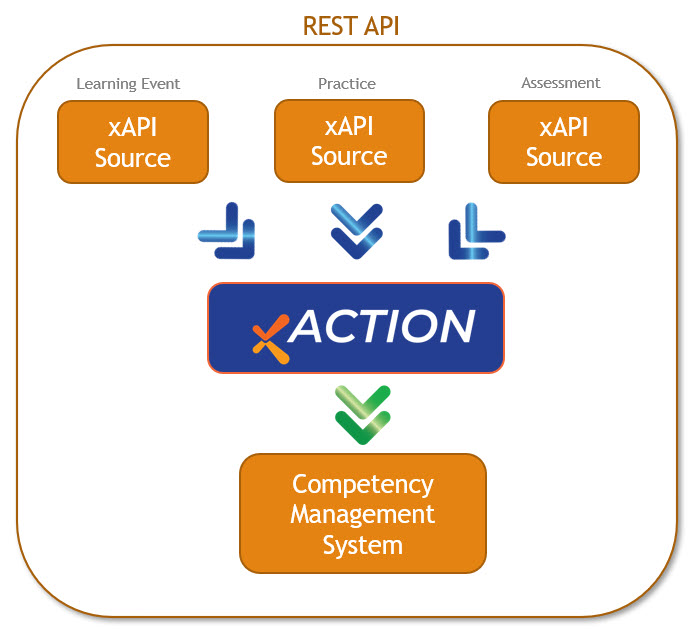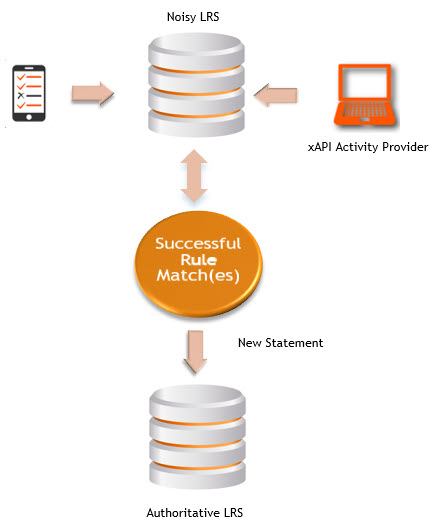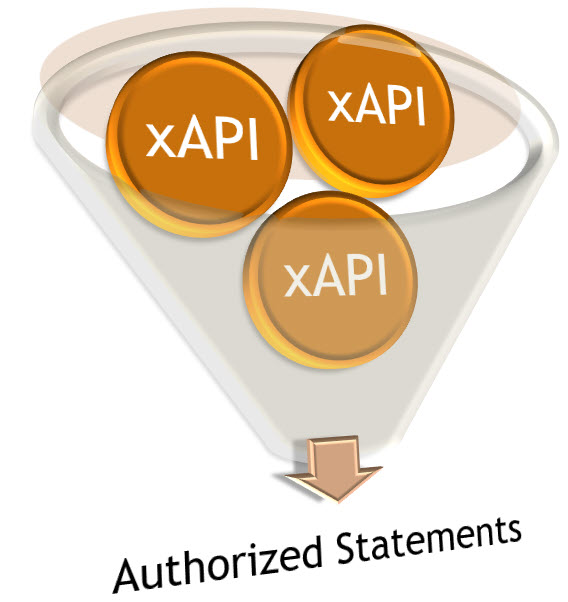Turning xAPI into ACTION
The Experience API, commonly known as xAPI, began as a US Department of Defense (DoD) initiative to establish a common method of recording learning experiences. xAPI has since been adopted by the IEEE as an international standard.
To bring the concept of xAPI to reality, our new solution xACTION employs a one-of-a-kind pattern-matching technology to receive and assess xAPI data from multiple sources. When the defined conditions are met, xACTION will update 3rd party applications using REST APIs, Intelligent Statement Forwarding or Statement Transformation. This could include providing a certification, documenting a competency, updating Human Resource applications and even granting access to secured facilities. The possibilities are endless as xACTION is the first and only application to provide code-free system interoperability and data portability, bringing to life the promise of xAPI.
Our Challenge

Why xAPI?
It is widely agreed in the Learning & Development community that most learning occurs outside of the traditional Learning Management System (LMS) model. Students learn from their peers, coaching sessions, simulations, gaming, XR, YouTube and other social media, and from experience on the job. The challenge is “How do we track all learning?”, not just the traditional training that occurs in the LMS.
xAPI History
xAPI was born as a concept to support interoperability of learning systems. The result is a common syntax for JSON statements to store learning data in a consistent way. Learning content, internet of things sensors (IoT), mobile applications, performance support tools, and other applications can use xAPI to record learning data in the same way. This consistency allows for portability of that data from one Learning Records Store (LRS) to another.

Limitations
While xAPI does an excellent job defining how learning experiences and performance are stored, the specification stops short of taking action based on this data. Learning Experience Designers are left to sort out what to do with the data collected and how to integrate with non-xAPI systems.
Opportunities
System Integration
 There is a clear need to allow xAPI data to interact with systems that do not have built-in xAPI capabilities. Consider these examples:
There is a clear need to allow xAPI data to interact with systems that do not have built-in xAPI capabilities. Consider these examples:
- xAPI statements indicating a student completed several learning activities could create a digital Learning Badge.
- If xAPI statements indicate that a student failed an activity three times an email could be sent to their supervisor recommending coaching.
- If xAPI statements indicate a student has met the requirements of a degree program, their employer’s HRIS could be updated with the new information.
Statement Forwarding
The ADL’s Training and Learning Architecture, or TLA, includes a concept of a “noisy”, or transactional LRS versus an Authoritative LRS. The noisy LRS gets a lot of statements, but only forwards selected statements to the Authoritative LRS. For example, the noisy LRS may have statements about each question on a test but only forward the test completion statement to the Authoritative LRS. xACTION allows you to create rules for when a statement should be forwarded. You can also anonymize data forwarded to the Authoritative LRS.
Statement Transformation
 Expanding on the concept of noisy versus Authoritative LRS, there is a need to transform statements in addition to statement forwarding. For example, if a student completes all courses in a curriculum, a statement could be sent to the Authoritative LRS to indicate that the curriculum has been completed.
Expanding on the concept of noisy versus Authoritative LRS, there is a need to transform statements in addition to statement forwarding. For example, if a student completes all courses in a curriculum, a statement could be sent to the Authoritative LRS to indicate that the curriculum has been completed.
Our Solution
xACTION allows for the creation of triggers based on patterns in xAPI data. xACTION matches xAPI statements
to those patterns. When one or more patterns are met, xACTION will make outbound REST calls to existing
APIs of other systems. xACTION bridges that gap between xAPI and other enterprise systems.
xACTION can also forward a statement to an Authoritative LRS once the rules are met. In addition, xACTION
can be used to create and send a new statement a LRS sent once the rules are met.
Statement Receiver
xACTION is designed to receive xAPI statements from multiple sources. Here are some common ways that xAPI statements can be sent to xACTION.
- The activity provider (i.e., the system that generates the xAPI statements) can send statements directly to xACTION.
- Most major LRS products support the concept of statement forwarding. Statement forwarding means that one LRS can forward the statements it receives to another LRS.
In xACTION users can configure approved xAPI sources. This means providing the credentials that the source will use when sending statements to xACTION.
 Pattern Matching
Pattern Matching
After receiving statements from authorized sources, xACTION analyzes statements to match “Trigger Rules”. Trigger Rules are created in xACTION Administrator by combining logical operators with xAPI data points. A single Trigger may contain multiple Rules, and it may take several statements for all Trigger Rules to be fully met.
Outbound Processor
Once all rules for a Trigger are matched, xACTION can call any REST API. That means updating learner data in other applications, providing learner credentials or badges and establishing new development plans. xACTION brings your xAPI data to life. Instead of providing only a historical record of learner activity, our patented solution can assist in integrating learning activities with all your software systems.
xACTION can also be used to forward selected statements to an LRS. Users can create one or more rules that when met will cause a statement to be forwarded.
Finally, xACTION can be used to send an entirely new statement based on rules. For example, if a task consists of several subtasks, statements could be sent to xACTION indicating that each subtask is complete. xACTION could then send a completion statement for the overall task to an LRS.
Next Steps
Ready to learn more about xACTION? Follow our blog for more xACTION use cases or contact info@xaction.online today to schedule a demo.




